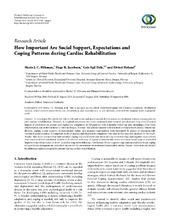How important are social support, expectations and coping patterns during cardiac rehabilitation
Peer reviewed, Journal article
Published version

Åpne
Permanent lenke
https://hdl.handle.net/1956/9847Utgivelsesdato
2014-09-15Metadata
Vis full innførselSamlinger
Originalversjon
https://doi.org/10.1155/2014/973549Sammendrag
Purpose. To investigate the predictive role of relevant social and psychosocial determinants on emotional distress among patients after cardiac rehabilitation. Methods. A longitudinal prospective study examined short-term (6 months) and long-term (2 years) impact of predictors on anxiety and depression complaints in 183 patients with 6-months follow-up data attending a four-week rehabilitation stay at the Krokeide Centre in Bergen, Norway. The patients mainly suffered from coronary heart disease. Emotional distress, coping, social support, socioeconomic status, and negative expectations were measured by means of internationally validated questionnaires. A composite score of anxiety and depression complaints was used as the outcome measure in the study. Results. This study revealed that task-oriented coping improved emotional status in long-term followup, and negative expectations were associated with emotional distress in short-term followup. A higher socioeconomic status and more social support predicted improved emotional status in short- as well as long-term followup. Conclusions. Fewer negative expectations and functional coping along with social support are important factors for the prevention of emotional distress after cardiac disease. Such elements should be addressed and encouraged in patients during cardiac rehabilitation.
